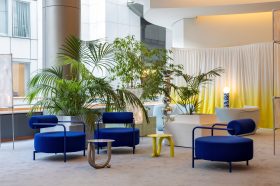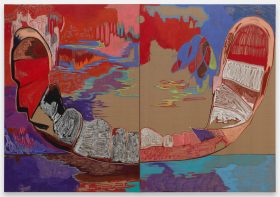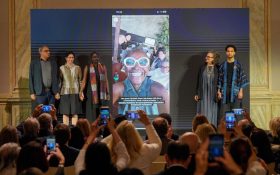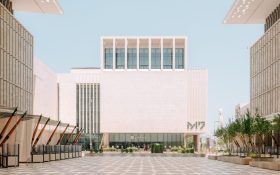A derelict building stacked high with rusting metal may not immediately appear to be the obvious home for an unusual and innovative creative venture, but, in the case of artists’ laboratory and contemporary think-tank, METAL, it’s a fitting origin. The sounds of steel may no longer be those that occupy the interior of the walls of METAL, once the ticket office of the West Hampstead Railway, but in recent years some new stirrings can be heard within the arches of this now thriving space.
When Jude Kelly, founder and now chair of METAL, first came across the building in 2000 she immediately saw potential others may have overlooked. She was seeking a space to house her idea, METAL, a multi-disciplinary concept, which would enable artists, thinkers and collaborators from a range of artistic and cultural backgrounds to come together to further the development of their work.
Perhaps it was the sense of atmosphere, history and creative productivity that convinced Kelly this was the right home for this journey. The concept for METAL first originated from a new direction in her own artistic development. After 26 years of working in the theatre Kelly felt the need for “a greater freedom of creative expression, outside of the safety net provided by an institution”.
For the past 60 years the space had been occupied by Tom Hunter’s metal workshop, and during this time was the space where Sir Anthony Caro created some of his steel sculptures of the 1960’s. If the early beginnings of Metal needed a solid base to grow from, this was it. Discussions began and the building was re-designed and renovated.
Now into its fifth year and with the expansion of a second METAL site opening in Liverpool in 2004, METAL is now well into the momentum of its programme, with a range of diverse activities and projects already under it’s belt. Here we have a space where visual artists, writers, theatre directors, performance artists, policy-makers, researchers and leaders from a range of cultural and artistic backgrounds, can come together under one roof to exchange ideas and engage in informal debate, processes and relationships.
Housing two studio spaces for sustained periods of artists residencies, mentoring programmes, as well as one-off bespoke events which facilitate conversation and dialogue, a sense of exploration links all activities where more meaningful connections, relationships and ideas can be cultivated organically and in an un-pressured context. With the addition of the second METAL building in Liverpool, METAL’s agenda can be seen to be growing, as the Liverpool building takes on more directly community-based projects, emphasising regional involvement.
Under the leadership of Kelly, and with Colette Bailey stepping up as Managing Director, METAL’s commitment to experimentation through process is what makes this organisation stand out from the crowd. An integral commitment to inclusiveness, collaboration and freedom of expression are the key ingredients for the initiative following Kelly’s belief that artists have the right to explore and experiment with a process without the pressure of having to create a product within a fixed time-scale. In fact, Bailey explains that METAL “started as an antidote to the way many funding bodies ask artists to formulate an outcome”. She continues, saying that METAL “provides a supportive, safe space for artists to make shifts in their practice, without pressure to create a product”.
It’s a simple form of engagement that differs from our conventional notion of artists’ networking and, in our often risk-averse funding culture, it’s a subtle and exploratory shift. Crucially, the element of risk-taking is central as artists engage in more exploratory lines of enquiry. Where artists traditionally operate within funding systems which require evidence of an outcome, METAL invests in the idea of trust in the process itself and poses some searching questions into our existing funding structures. Where risk may bring about fear from funding bodies, METAL invites the notion that a framework for creative exploration could and should be supported.
The results of a fruitful METAL collaborative process are well evident in the theatre project King Cotton, which will go to production at the Lowry theatre, Salford, this September. With Kelly directing the work, King Cotton brings together the narratives of two men, a black slave working in the cotton plantations in America and a mill-worker from the North of England. Delving deep into the history of the slave trade, cotton is the thread that links the two men’s stories together.
Ian Brownbill, the man behind the idea, and award-winning playwright Jimmy McGovern haven’t looked back since they became involved with METAL five years ago. Brownbill explains that the process of working on King Cotton with McGovern was already in development when Lowry’s Artistic Director, Robert Robson first introduced them both to Jude Kelly. “Impressed by what we had seen and heard at West Hampstead, Jimmy and I encouraged Metal to think about moving to Kensington, Liverpool” he says.
Conducive to the METAL concept are the in-house breakfasts lunches and suppers which take place around an AGA, donated specifically to the project and lending a central sense of warmth and generosity to the gatherings and creating a setting where food, knowledge and experience can be shared. Dinners are planned around ideas and themes which have their starting point in an artists’ work, as was the case for Hugo Zapata and Luis Fernando Pelaez, two of Columbia’s leading sculptors. Zapata and Pelaez were invited by METAL in 2003 to come to the UK to meet with leading artists, architects and politicians in connection with their own ambitious projects taking place in their home country. A supper was held to celebrate the artists’ arrival and the artists’ views on culture as a catalyst for regeneration could be explored. Ongoing dialogues with Zapata and Pelaez are still active today.
Commitment to a wider cultural discourse is evident in METAL’s involvement with a range of other international networks, organisations and individuals from overseas. Forging new International relationships lead to a lunch at METAL inviting curators, artists and individuals who are in the process of developing creative links with China. The lunch acted as a starting point for new creative relationships to be formed with a view to developing invaluable new cultural avenues and relationships between the UK and China. With it’s cultural agenda broadening the METAL journey continues.
Find out more at METAL.




